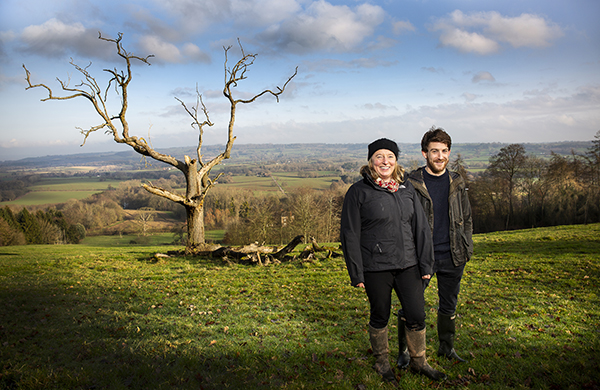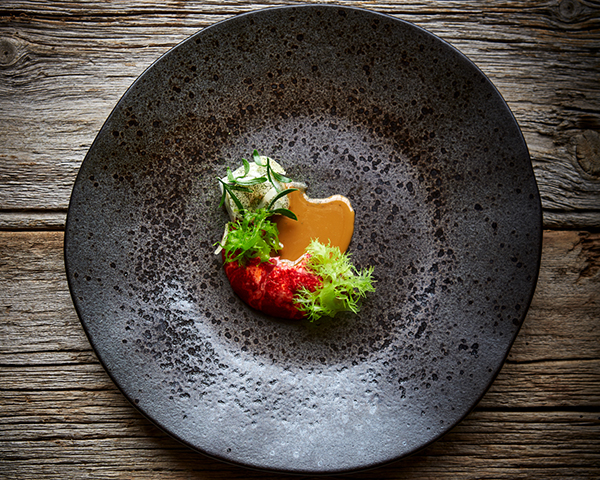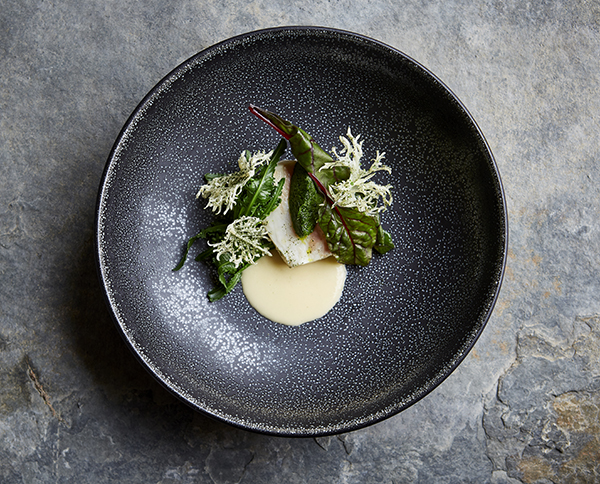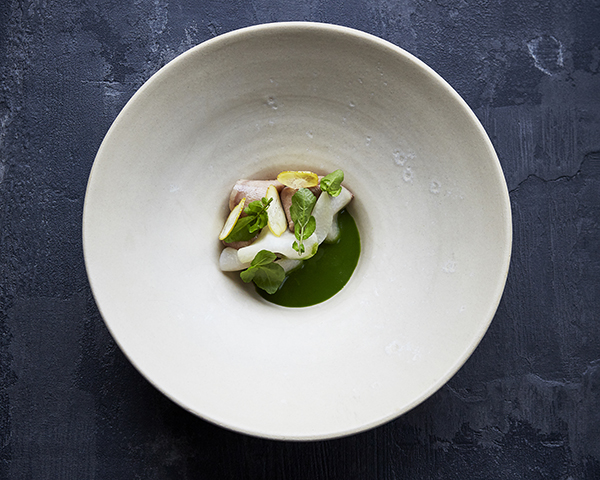Lee Westcott on following the seasons at Pensons on the historic Netherwood Estate
Lee Westcott, former chef at London's Typing Room, has turned away from the capital's bright lights in favour of sustainable living and the fine produce grown at the Netherwood Estate.
The historic Netherwood Estate stretches across 1,200 undulant acres of unspoilt countryside on the Herefordshire-Worcestershire border. It is here that chef Lee Westcott has discovered a new affinity with the seasons, as he takes inspiration from produce yielded by the rugged landscape around him.
Peta Darnley, managing partner of the family estate, is collaborating with Westcott to produce a restaurant that is inspired and largely sourced by the estate. The land incorporates a working mixed farm of livestock and crops, orchards of traditional cider apples, a medieval deer park and endless foraging opportunities among the woodlands, lakes and open spaces.
Westcott has arrived in the countryside after 12 years in London and Hong Kong, working with the likes of Tom Aikens and Jason Atherton before opening the Typing Room in the Town Hall hotel in London's Bethnal Green, which he closed in June last year to pursue other projects.
It was while at the Typing Room that he met Darnley, who, impressed by Westcott's debut restaurant, asked for his advice on the estate's plans. The chef says: "Peta invited me to come and stay. I was only going to look over their kitchen design and what they planned to do, but when I came, I fell in love with the place and said if we're both serious about this we can jump into it."
Darnley describes the visit as a "meeting of minds", as the two discussed what could be done with the produce from the estate, supplemented by other local farmers. She explains that anything that can be grown in Britain is grown in Herefordshire. One of the country's best asparagus farms is just down the road, soft fruit is grown across the county and, of course, Herefordshire beef has been long been lauded. The only stumbling block is seafood, which the restaurant will source from the Cornish coast and the north-west coast of Scotland.
A complete transformation
Seven months after his first visit, Pensons is almost ready to open. Dilapidated farm buildings have been transformed into a bright, open restaurant of brick, wood and stone that highlights the history of the estate, from the wooden manger, which hangs above diners' heads, to the artefacts dug from the land, featured on the walls like pieces of art.
He explains: "As a chef, it's all about the seasons, but here that's elevated to another level. I'm in it, I'm among it. Don't get me wrong, in London you can go walking in Victoria Park, you notice the seasons, but it's different here. I drive past and see the blossom coming out, and that's only going to enhance my ability to write menus.
"I'll have weekly meetings with the gamekeeper and the gardener and they may say, 'I've got four kilos of these beautiful turnips and they're at their peak,' and I can come and have a look and have them for the next morning. It's not about being self-sufficient, it's just about growing sustainably and having some fun with it."
The produce sourced from the estate is diverse, ranging from honey and rose hips to beef, lamb, game and deer. The rape crop has been cold-pressed to produce oil, and Darnley and Westcott are looking into producing flour from the wheat. The large kitchen garden will supplement what is already produced and the chef has a list of things he wants to try and grow, explaining that the first year will be "a learning process".
uated alongside the restaurant, the garden will use manure from the farm as well as compost made from waste from the restaurant to grow the next crops. Westcott adds: "It's great for the environment and great for the product. It's a real true cycle."
Westcott stresses that he's not arrived to play at being a farmer - there are experts rearing the livestock and managing the land - but to develop a greater understanding of food production and how it has had an impact on his development of dishes and menus.
The chef explains: "I think as chefs in London we take for granted what we can get. We are so blessed in the UK; this little island is surrounded by beautiful fish and inland we grow the most amazing vegetables, rear amazing animals and, being here, I'm actually part of that. I don't just get a piece of meat or a vegetable given to me, I get to see the process - it's made me think I don't need to do as much to it. You respect the ingredient a little bit more because you know how much work, dedication, effort and passion has gone into it.
PensonsCovers 32 plus 14-cover private dining room Sample dishes Jerusalem artichoke, cod and truffle; beef tongue, turnip, chestnut and watercress; lamb, turnip, potato and onion; beetroot, chocolate and blackberry Drinks Short wine and cocktail lists will be curated to correspond with the seasons and dishes offered Opening date 24 January 2019 Restaurant manager Andrew Phillips
Accommodation There are two guest houses on the Netherwood Estate, the Hyde and the Freeth. The Hyde is a Grade II\*-listed medieval hall house. It can sleep 20 people and is available for exclusive use at weekends or by the room on a bed-and-breakfast basis mid-week. The estate won awards for the restoration of the building and those staying can enjoy the garden, large terrace, tennis court, hot tub and the largest private steam railway in the country. The Freeth is a Grade II-listed former hunting lodge that sleeps 18 and is available for exclusive use. It has a garden designed by Robert Myers that includes a south-facing terrace and a private indoor swimming pool. Darnley said that further down the line, if the opportunity presented itself, accommodation on the estate could be expanded but, in the meantime, the estate will work with other local operators to help their guests create the perfect break.
About the Netherwood Estate Netherwood is an ancient estate that straddles the Herefordshire-Worcestershire border, equidistant between Bromyard and Tenbury Wells. It features in the Domesday Book and, in the medieval period, was owned by the Mortimers who, at that point, were the most powerful family in England. Mortimer Edward IV would be crowned King in 1461, during the turbulent years of the War of the Roses. The Mortimers established a notable deer park on the estate, which in Tudor times became home to the Earls of Essex, one of whom - Robert Devereux - was a favourite at the court of Elizabeth I, before a failed bid to raise a revolt against the government saw him tried and executed for treason. Today the estate remains unspoilt with plans afoot to reinstate the deer park. Areas of land are used for a mixture of arable - wheat, oats and oilseed rape - as well as livestock. Diversifying the land for the future has also seen enterprises such as large, luxury holiday lets established, as well as a textile weaving mill and, of course, Pensons restaurant. Get The Caterer every week on your smartphone, tablet, or even in good old-fashioned hard copy (or all three!).
Continue reading
You need to be a premium member to view this. Subscribe from just 99p per week.
Already subscribed? Log In











